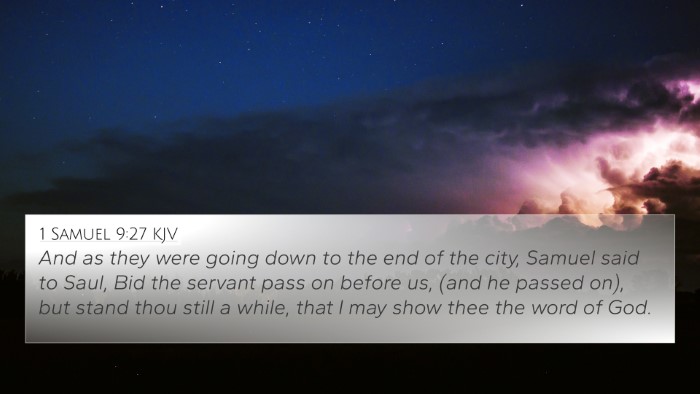Understanding 1 Samuel 15:16
1 Samuel 15:16: "Then Samuel said to Saul, 'Stay, and I will tell you what the LORD said to me this night.' And he said to him, 'Say on.'
Meaning and Interpretation
This verse marks a significant moment in the narrative of Saul’s kingship over Israel. Samuel's call to Saul is filled with gravity, reflecting the divine message that has come to him regarding Saul’s actions. The insights from Matthew Henry, Albert Barnes, and Adam Clarke provide an enriched understanding of this passage.
Key Insights from Commentaries
-
Matthew Henry: Henry emphasizes the importance of Samuel as God’s prophet, how he takes on the role of conveying vital messages to leaders. He highlights that Samuel had a solemn duty to address Saul regarding his disobedience to God's command, indicating that accountability is key in leadership.
-
Albert Barnes: Barnes notes that the phrase “Stay, and I will tell you” shows Samuel's intention to reveal God’s displeasure with Saul’s actions. This reflects the serious nature of prophetic messaging and God's expectations of his chosen leaders.
-
Adam Clarke: Clarke elaborates on the context of Saul’s recent wrongdoing — disobedience in the battle against Amalek. He suggests that Samuel's readiness to speak indicates a critical turning point in God’s relationship with Saul, who did not follow divine guidance faithfully.
Cross-References
This verse connects with several other Scriptures, showcasing themes of obedience, accountability, and divine communication:
- 1 Samuel 15:22-23: This speaks to the idea that God values obedience over sacrifice, which is a direct commentary on Saul’s failure.
- Deuteronomy 17:18-20: It provides guidelines on how kings should govern, emphasizing adherence to God’s laws.
- Proverbs 16:10: This verse addresses the importance of divine communication to those in power, implicating the necessity of prophetic guidance.
- 1 Chronicles 10:13-14: It reflects on how Saul’s death was a result of disobedience to the Lord, further illustrating the consequences of failing to heed God’s voice.
- 2 Samuel 1:14: Here, David’s response to Saul’s death indicates the prophet’s significant role in guiding kings.
- Ezekiel 33:7-9: The prophet’s responsibility to warn the wicked ties back to Samuel’s challenge to Saul, reflecting the ongoing theme of prophetic intervention.
- Acts 13:22: Paul recounts this historical context, pointing to David as a man after God’s own heart, contrasting Saul’s leadership.
Thematic Connections and Analysis
The broader narrative seen in 1 Samuel 15:16 addresses several overarching themes:
-
Prophetic Authority: The role of prophets in relation to kings sharply delineates the hierarchy of God’s order and the accountability of leaders (see 2 Samuel 12:1).
-
Obedience and Consequences: The dire results of disobedience are illustrated throughout Scripture, particularly in Saul’s life when compared to obedient figures such as David.
-
Divine Communication: The importance of conveying God’s messages is a recurrent theme, epitomized by the prophetic traditions found in both the Old and New Testament.
Reflection and Application
For modern readers, understanding this verse invites reflection on leadership integrity and the role of divine guidance in our decisions. As Saul’s story warns against pride and disobedience, it also serves to highlight the necessity for all leaders—spiritual and secular—to heed the wisdom imparted by God.
Tools for Bible Cross-Referencing
For those wishing to study cross-references in the Bible further, several tools and methodologies can enhance understanding:
- Utilizing a Bible Concordance to locate key themes and related verses.
- Employing a Cross-Reference Bible Study Guide for structured analysis.
- Engaging in Cross-Referencing Bible Study Methods that connect different books and verses through thematic analysis.
- Exploring Comprehensive Bible Cross-Reference Materials to ensure thorough understanding and classification of scripture.
Conclusion
In summary, 1 Samuel 15:16 illustrates a pivotal moment in the scripture, resonating with the theme of divine authority, leadership accountability, and the necessity for prophetic guidance. The insights gathered from classical commentaries provide depth, while cross-references enrich our understanding of the continuous dialogue found within the Bible.





